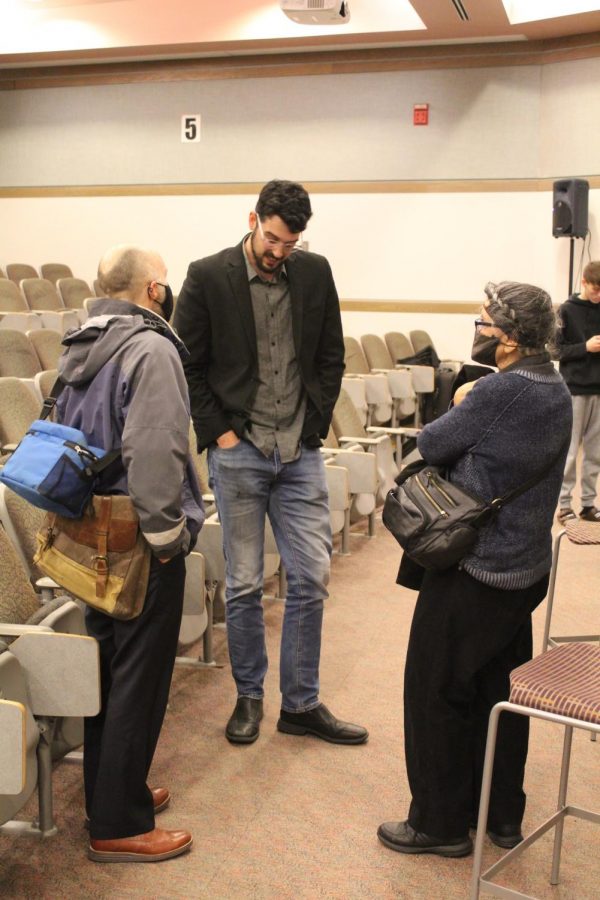Local journalism thrives in ‘Storm Lake’
Tom Cullen (pictured above, center), talks with audience members after the screening of “Storm Lake.”
Dec 6, 2021
Documentary screened Thursday following the Pulitzer Prize winning Storm Lake
Students, faculty and community members all gathered in anticipation at John Deere Auditorium in Curris Business Building Thursday evening to watch the screening of “Storm Lake.” The documentary follows a family-run newspaper, the Storm Lake Times, as they fight to keep local independent journalism alive. The newspaper won the Pulitzer Prize in 2017 “for editorials fueled by tenacious reporting, impressive expertise and engaging writing that successfully challenged powerful corporate agricultural interests in Iowa.”
The paper is family owned and operated by the Cullen family, and spearheaded by its editor and chief Art Cullen, a grey haired, Marlboro Red – smoking journalist with the mantra “print the truth and raise hell.”
Tom Cullen, Art Cullen’s son, is a reporter for the Times and is an alumni of UNI who graduated in 2015 with a degree in economics. He joined in watching the screening Thursday and participated in a Q&A after the documentary. “You wouldn’t believe the extent to which I am humbled in seeing a documentary screening here in which I have somewhat of a starring role,” Cullen said.
He also noted John Deere Auditorium as “the first classroom he set foot in at UNI,” and that he “didn’t envision myself being an economics major or anything, I had no idea what I was doing. Luckily I had some professors shepherding me around and they are sprinkled throughout this auditorium as we speak. My heart just swells with pride. What a turn of events. I think it was back there where I had my first lesson with Dr. McCormick and now I’m up here. I think I’ve been promoted.”
Cullen first joined the Times after he graduated and flunked the law school test. “I actually explored at least four different majors here, and I tried to avoid journalism like the plague,” he said. “It took a lot out of my parents and I saw that growing up as a kid. Dad’s hair is grey not just because he smokes a pack of Marlboro Reds everyday. It’s a lot of work. So I had my eyes wide open going into that. But the reason I came back was our essential philosophy that’s been dad’s guiding principle: ‘print the truth and raise hell.’”
Cullen also stressed the significance of having the Times be a locally run newspaper.
“I stumbled upon a very advantageous wΩarrangement which would give me the freedom to write what I want, and the only person I would have to answer to is a guy who has my back. I don’t think we would be here if it were a corporate newspaper.”
In order to assist locally run newspapers financially after the pandemic brought many papers to the brink of bankruptcy, the Times established the Western Iowan Journalism Foundation which aims at sustaining local journalism, connecting the community and promoting democracy. So far they have raised $41,401 of their $100,000 goal. To donate, visit https://www.westerniowajournalismfoundation.com/donate.
To watch the documentary, visit pbs.org and search “Storm Lake.”















